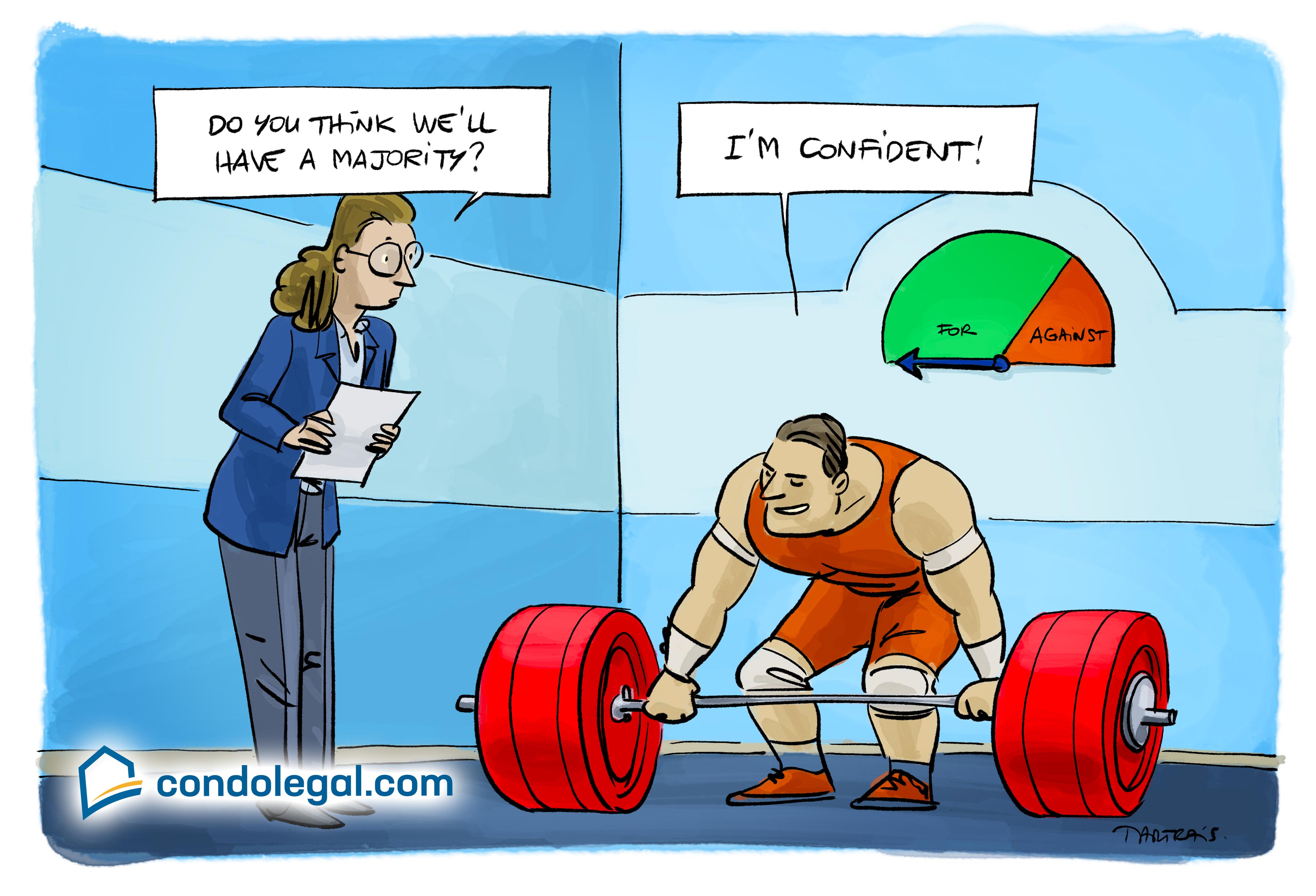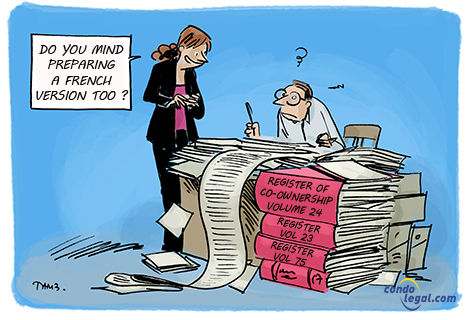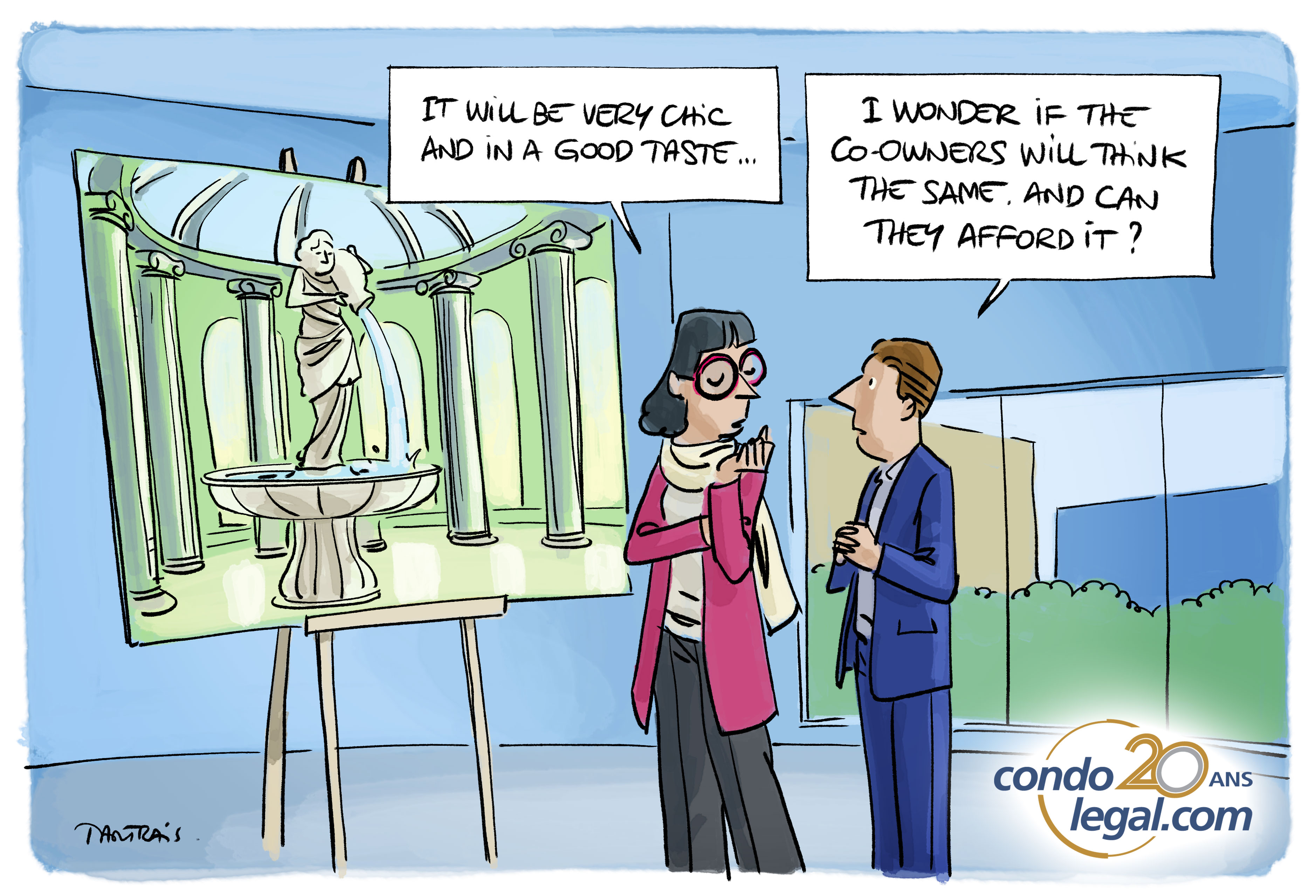Enhanced majority
 The Civil Code of Quebec requires an enhanced majority for certain decisions that have a greater impact on the community of co-owners or on their individual rights. These decisions can significantly influence the daily lives of co-owners and the value of their properties. In addition, this enhanced majority is intended to temper the influence of certain co-owners who, because of the large number of voting rights they hold over their fraction, could otherwise dominate the decisions taken at the meetings.The law thus seeks to balance the rights and interests of all co-owners by requiring a reinforced majority for certain important decisions.
The Civil Code of Quebec requires an enhanced majority for certain decisions that have a greater impact on the community of co-owners or on their individual rights. These decisions can significantly influence the daily lives of co-owners and the value of their properties. In addition, this enhanced majority is intended to temper the influence of certain co-owners who, because of the large number of voting rights they hold over their fraction, could otherwise dominate the decisions taken at the meetings.The law thus seeks to balance the rights and interests of all co-owners by requiring a reinforced majority for certain important decisions.
Object
Article 1097 of the Civil Code of Quebec requires a reinforced majority for the following decisions:
Method of calculation
A decision adopted by an enhanced majority is one that has the favorable vote of three-quarters (75%) of the co-owners' votes who are present or represented at the meeting. Therefore, it is only the total number of votes that is considered, not the number of co-owners present or represented. This majority comes from the co-ownership legislative reform that came into effect on January 10, 2020. To address a high absenteeism rate at co-ownership' meetings, the legislator made it easier to make decisions as stated in article 1097 of the Civil Code of Québec, replacing a double majority with an enhanced majority.
Examples
Imagine that at the annual meeting, co-owners are asked to vote on a resolution authorizing the board of directors to undertake improvements to the entrance hall.
Case where the resolution is adopted
The co-owners present or represented hold a total of 2,500 votes. For the resolution to be adopted with a supermajority, it must receive 75% of the votes, or 1,875 votes.
Vote results:
- 1,900 votes in favor of the resolution
- 400 votes against
- 200 abstentions
Since the resolution received 1,900 favorable votes, exceeding the required threshold of 1,875 votes for a supermajority, it is adopted. The board of directors can therefore proceed with the improvements to the entrance hall.
Case where the resolution is rejected
In another scenario, the co-owners present or represented, for a total of 2,500 votes, vote as follows:
- 1,500 votes in favor of the resolution
- 600 votes against
- 400 abstentions
In this case, the resolution is rejected, as it only received 1,500 favorable votes, which is below the threshold of 1,875 votes required for a supermajority. Therefore, the board of directors cannot proceed with the improvements to the entrance hall.
Make-up meeting
Article 1089 para. 2 of the Civil Code of Québec establishes specific rules for make-up meetings, i.e., meetings that are convened when a quorum is not present at the first meeting. According to this article, the decisions referred to in article 1097 of the Civil Code of Québec may only be taken at this new meeting if the co-owners present or represented hold at least a majority of the votes of all the co-owners (50% + 1). The reason why a reinforced majority is required for these decisions at a catch-up meeting is to protect the rights of the co-owners. Indeed, these decisions can have significant consequences on life in co-ownership and on the value of the co-owners' property. Therefore, it is essential that these decisions are made with the consent of the majority of the co-owners, to ensure that the interests of the majority of the co-owners are taken into account and respected.
 WHAT YOU SHOULD KNOW ! A quorum must be established at the opening of the meeting of co-owners, but sometimes during the processing of the questions to be voted on. It should be noted that any co-owner may ask the chairman of the meeting to adjourn if there is no longer a quorum.
WHAT YOU SHOULD KNOW ! A quorum must be established at the opening of the meeting of co-owners, but sometimes during the processing of the questions to be voted on. It should be noted that any co-owner may ask the chairman of the meeting to adjourn if there is no longer a quorum.
 WHAT TO KEEP IN MIND: Article 1097 of the Civil Code of Québec deals with decisions of particular importance that may have a significant impact on the community of co-owners or on their individual rights. These decisions include, among other things, the deeds of acquisition or alienation of real estate by the syndicate, the work of transformation, extension or improvement of the common portions, and the modification of the deed of co-ownership and the descriptive statement of fractions.
WHAT TO KEEP IN MIND: Article 1097 of the Civil Code of Québec deals with decisions of particular importance that may have a significant impact on the community of co-owners or on their individual rights. These decisions include, among other things, the deeds of acquisition or alienation of real estate by the syndicate, the work of transformation, extension or improvement of the common portions, and the modification of the deed of co-ownership and the descriptive statement of fractions.
 WARNING ! The decisions referred to in article 1097 of the Civil Code of Québec may only be taken at a make-up meeting if the co-owners present or represented at the meeting represent at least a majority of the votes (50 % + 1) of all the co-owners.
WARNING ! The decisions referred to in article 1097 of the Civil Code of Québec may only be taken at a make-up meeting if the co-owners present or represented at the meeting represent at least a majority of the votes (50 % + 1) of all the co-owners.
 WARNING ! Before a vote is taken, it is strongly recommended to verify the percentage of the votes of the owners present or represented, to determine the number of votes required for a decision. Staying on top of the co-owners arrivals and departures during the Meeting of co-owners is another important element, to avoid the occurrence of an error in the tally . Even more so if a ballot is expected to be tight.
WARNING ! Before a vote is taken, it is strongly recommended to verify the percentage of the votes of the owners present or represented, to determine the number of votes required for a decision. Staying on top of the co-owners arrivals and departures during the Meeting of co-owners is another important element, to avoid the occurrence of an error in the tally . Even more so if a ballot is expected to be tight.
Return to the super-factsheet ''Majorities required in Meeting ''





